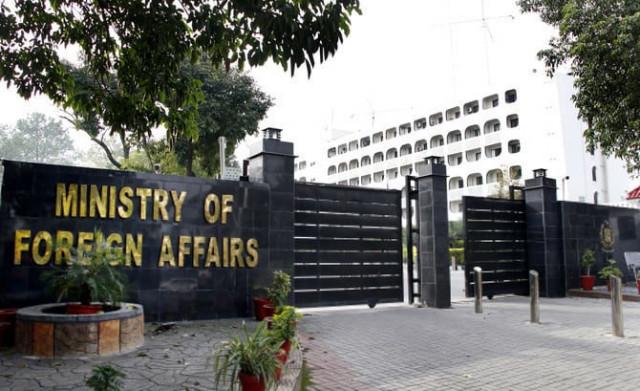Pakistan has rejected the Indian statements made during Lok Sabha’s debate about “Sindoor Operation”, calling them without foundation and provocative. The spokesman of the Ministry of Foreign Affairs sentenced India on Wednesday for distorting facts, justifying the aggression and using the conflict for the internal political benefit.
According to FO spokesman, India’s actions are a continuation of his tendency to manufacture accusations without credible evidence. Pakistan categorically rejected the notion of “Operation Sindor”, which Indian leaders described as a military success aimed at an alleged terrorist infrastructure in Pakistan.
Read: The field marshal reaffirms the commitment to eliminate terrorism, building Baluchistan
The spokesman reminded the world that India’s attack against Pakistan during the night from May 6 to 7 resulted in the martyrdom of innocent civilians, including men, women and children. “India did not achieve any of its strategic goals,” said the spokesman, adding that Pakistan’s contraction in combat planes and neutralizing and military military objectives remains an indisputable fact.
Declaration of the spokesman in response to the consultations of the media related to the debate in the Indian Parliament on the Sindoor operation.
Responding to media consultations on the debate in the Indian Parliament about the so -called “Sindoor Operation,” said the spokesman: … pic.twitter.com/ijcwmzubfn
– Ministry of Foreign Affairs – Pakistan (@ForeforeignEffick) July 30, 2025
Pakistan also criticized India’s refusal to participate in a transparent and independent investigation into Pahalgam’s attack, despite an offer made by Pakistan’s prime minister to investigate the matter. Instead of accepting the offer of impartial investigation, India chose to increase tensions and act unilaterally. “India acted as a judge, jury and executioner at the same time,” said the spokesman.
The spokesman further dismissed India’s claims about the so -called “MAHADE OPERATION”, calling it a manufactured narrative. The declaration of the Interior Minister of India was described as unreliable, which raises serious doubts about its credibility. Pakistan said that the alleged perpetrators of Pahalgam’s attack were killed just before Lok Sabha’s debate began, questioning the moment and validity of the Indian version of events.
Read more: Rahul hits Modi on Operation Sindoor Spin
Pakistan also strongly rejected the continuous insistence of India in establishing a “new normality” in bilateral relations. “For us, the only ‘normal’ in bilateral relations is respect for sovereignty, territorial integrity and adherence to the principles and purposes of the UN Charter,” said the spokesman. Pakistan has made it clear that any future aggression will meet the force, as evidenced by its decisive actions in May 2025.
Pakistan also reiterated his rejection of India’s accusations with respect to “nuclear blackmail”, calling such misleading. “The narrative of India is a selfish attempt to blame Pakistan and divert the attention of his own stairs,” said the spokesman. Pakistan said he uses his conventional abilities to deter aggression, not to increase the conflict.
In addition to the military statements, Pakistan registered his disapproval of the unilateral actions of India on the Indo Water Treaty. The spokesman condemned India’s decision to keep the treaty in suspense, arguing that such movement shows shameless contempt for international treaties and undermines regional cooperation. “India must immediately fulfill its treaty obligations instead of celebrating illegal and unilateral actions,” said the spokesman.
The statement concluded by warning that India dependence on misinformation and aggressive rhetoric risks destabilizing southern Asia. However, Pakistan remains committed to peace, regional stability and significant dialogue aimed at solving all pending problems, including the central Jammu and Kashmir dispute.
Also read: Pakistan makes an overture of peace to India
The recent conflict between Pakistan and India marked an important military escalation between the two nuclear powers. The tension between Pakistan and India increased after the attack of the pahalgama on April 22 in Jammu and Kashmir (Iiojk) illegally occupied, which killed 26 tourists.
In response, India carried out a series of hostile shares the next day on April 23, including the suspension of the 65-year-old Indus Water Treaty (IWT), canceling visas for Pakistani citizens, closing the border crossing of Wagah-Attari, ordering the closure of Pakistan’s high commission in New Delhi. Subsequently, India and Pakistan reduced diplomatic personnel in their respective embassies in the countries of the other.
Pakistan strongly rejected the accusation, qualifying it without foundation, but took reciprocal measures through its National Security Committee (NSC). These included stopping the trade with India, closing the Pakistani airspace to the Indian aircraft and other contracts.
On the night of May 7, the Indian Air Force launched an attack not caused against civil objectives in Pakistan. The Pakistan Air Force (PAF) immediately retaliates and demolished at least six IAF aircraft, including three raphales built by the French.
By increasing more, on the night from May 9 to 10, India launched another round of strikes against Pakistan, but this time he attacked military sites and air bases.
In retaliation, Pakistan launched the Bunyanum Marsoos operation, which dates back to Indian military facilities, including missile storage sites, air bases and other strategic objectives. The attack early in the morning were a shock for Indian military leadership, which had underestimated Pakistan’s response to his unprovoked attacks.
When the spiral conflict, the president of the United States, Donald Trump, announced on May 10 that the fire had been reached after intense diplomatic efforts during the night. The two parts gradually reduced the number of troops from the international border in the following weeks.




